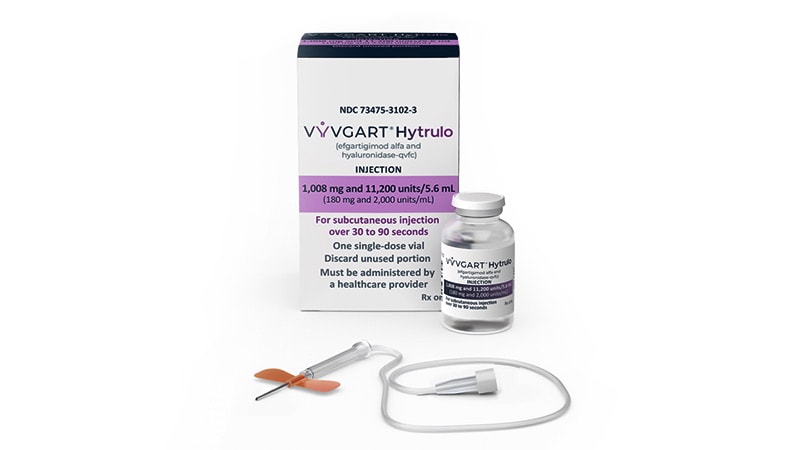MONTREAL — An investigational oral aldose reductase inhibitor, govorestat, significantly improved primary outcomes of physical function and serum sorbitol reduction in patients with sorbitol dehydrogenase (SORD) deficiency, the interim results of the phase 3 INSPIRE trial showed.
At the 12-month point of the 24-month prospective trial, patients randomly assigned to receive daily govorestat 20 mg/kg had statistically significant improvements on the Charcot-Marie-Tooth Functional Outcome Measure (CMT-FOM) compared with those who received placebo.
For the primary pharmacodynamic/biomarker endpoint, treated patients also had a sustained reduction in sorbitol levels that was statistically significant vs placebo.
"For secondary outcomes, there was a highly significant effect of govorestat on the CMT Health Index, an important patient-reported outcome measure of disease severity and well-being, including lower limb function, mobility, fatigue, pain, sensory function, and upper limb function," lead investigator Michael Shy, MD, professor of neurology at the University of Iowa in Iowa City, reported.
The findings were presented on June 25 at the Peripheral Nerve Society (PNS) Annual Meeting 2024.
Therapies Needed
SORD deficiency is a progressive, debilitating, hereditary neuropathy with an average age of onset of 17 years. It is estimated to affect approximately 3000 people in the United States and 4000 in Europe.
People with SORD deficiency are unable to metabolize sorbitol, which is toxic to neurons, resulting in accumulations of sorbitol of up to 100 times the normal level. This damages peripheral nerves and motor neurons, resulting in significant disability, loss of sensory function, and decreased mobility.
There are currently no approved therapies for SORD deficiency, but the INSPIRE trial is testing govorestat, an aldose reductase inhibitor that prevents the conversion of glucose to sorbitol.
The study enrolled 56 patients (mean age, 34 years; 32% women) and stratified them at baseline as mild (60.7%), moderate (25%), or severely affected (14.3%), based on results of the 10-meter walk/run test (10MWRT). Mean serum sorbitol levels were 30,200 ng/mL at baseline.
The patients were randomized 1:1 to placebo or govorestat, with the treated arm showing a 52% reduction in serum sorbitol at 12 months — a statistically significant difference compared with placebo (P < .001).
Lower sorbitol levels at 12 months correlated with greater improvement in clinical outcomes on the lower limb composite of the CMT-FOM (P = .05). This included statistically significant differences to placebo on the 10MWRT (P = .258), dorsiflexion (P = .314), and the 6-minute walk (P = .606), but not two other components of the composite: The 4-stair climb or the sit-to-stand test.
"We found it interesting that these are proximal rather than distal components, suggesting — and this is not definitive —perhaps that there's a distal predominance in benefits," Shy said.
On the CMT Health Index, an important patient-reported outcome measure of disease severity and well-being, there was a highly significant effect of govorestat compared to placebo (−6.88 mean difference in scores at 12 months, P = .01).
As the trial proceeds to its 24-month conclusion, 51 patients out of 56 are still in the study, with only five discontinuations.
Adverse effects were mostly mild and were similar between groups, but "there was one severe adverse effect. This was thought to be due to a preexisting condition and not related to the drug," Shy said.
The company plans to discuss a potential new drug application submission with the US Food and Drug Administration based on this clinical data, a press statement noted.
Implications for Diabetic Neuropathy
Commenting on the study for Medscape Medical News, Gordon Smith, MD, professor and chair of neurology at Virginia Commonwealth University in Richmond, Virginia, called the findings "exciting."
"Right now, there is no disease-modifying therapy for genetic neuropathies, so if found efficacious, this would be the first treatment available for a specific form," Smith said.
"This is a truly amazing story in many ways, and particularly exciting is how little time it took to progress from gene discovery to a well-designed clinical trial," he said.
"Another very interesting aspect of this work is the implication the results may have for therapy for diabetic neuropathy, which is very common and is also associated with accumulation of sorbitol," Smith added. "While numerous trials of aldose reductase inhibitors failed to demonstrate meaningful clinical impact in the past, this work promises to inform our understanding of how excess sorbitol may lead to axonal injury."
The study was funded by Grant Therapeutics. Shy and Smith had no disclosures.

.webp) 2 days ago
4
2 days ago
4

























 English (US)
English (US)